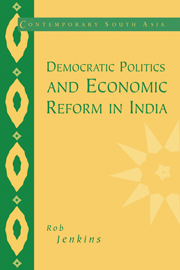Book contents
- Frontmatter
- Contents
- For M.S.J.
- Acknowledgements
- Map: States of the Indian federal union
- 1 Introduction
- 2 The evolution of economic reform in India
- 3 Theoretical and comparative perspectives on the politics of economic reform
- 4 Political incentives: elite perceptions and the calculus of survival
- 5 Political institutions: federalism, informal networks, and the management of dissent
- 6 Political skills: introducing reform by stealth
- 7 Implications
- Bibliography
- Index
1 - Introduction
Published online by Cambridge University Press: 13 May 2010
- Frontmatter
- Contents
- For M.S.J.
- Acknowledgements
- Map: States of the Indian federal union
- 1 Introduction
- 2 The evolution of economic reform in India
- 3 Theoretical and comparative perspectives on the politics of economic reform
- 4 Political incentives: elite perceptions and the calculus of survival
- 5 Political institutions: federalism, informal networks, and the management of dissent
- 6 Political skills: introducing reform by stealth
- 7 Implications
- Bibliography
- Index
Summary
‘India has fundamentally altered its development strategy’, the World Bank announced in 1996. Government initiatives since 1991 to restructure the basis of the Indian economy ‘ended four decades of planning and have initiated a quiet economic revolution’. Whether this will produce the economic results hoped for by Indian and foreign advocates of liberal reform remains to be seen. But the wide-ranging reorientation of economic policy has already demonstrated a quality which has surprised many observers – staying power. As this book goes to press in mid-1999, the liberalisation process has not been reversed. New reforms continue to be unveiled on a regular basis, while with each passing day the early policy breakthroughs become further entrenched, as people and organizations operate in accordance with them. New approaches to policy on trade, foreign exchange, anti-trust regulation, banking, industry, foreign investment, and many others are now a familiar part of economic life. Because liberalisation is an open-ended process, the policy landscape continues to evolve. But many of the old landmarks have faded from view. Even two changes of government – towards the left in 1996, and then rightwards in 1998 – did not lead to retreat. In many ways economic reform was strengthened after each of these elections.
This is a transformation that requires explanation. The objective of this study is to account for the capacity of the Indian political system to sustain policy reform over an extended period of time in the face of formidable political obstacles. Dismantling a system of state control is a notoriously difficult task. Witness the on-again-off-again reform programmes throughout the developing world.
- Type
- Chapter
- Information
- Democratic Politics and Economic Reform in India , pp. 1 - 11Publisher: Cambridge University PressPrint publication year: 2000



